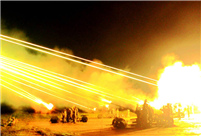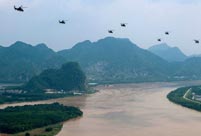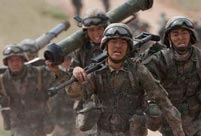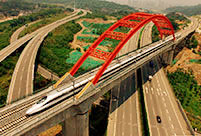

BAGHDAD, June 10 -- Hundreds of thousands of civilians in Iraq's northern city of Mosul are living with fear and uncertainty, a year after the Islamic State (IS) militant group occupied their city.
Since the fall of Nineveh's provincial capital city of Mosul, some 400 km north of Baghdad, on last June 10, the group formed so-called Shari'a court, and carried out cruel and inhuman punishment against men, women and children who are accused of violating the group's extremist interpretation of Islamic Shari'a (religious law).
"Mosul faces difficult circumstances and suffers from many problems, including power cut, fuel shortages, acute shortage of medicines and medical supplies as well as drinking water," Mohammed Ibrahim al-Baiyati, the head of security committee of Nineveh's provincial council, told Xinhua.
"The situations in the IS-held city of Mosul is getting worse, as the extremist militants are imposing cruel governance on the residents that are not fit the modern life, in addition to their intimidation and terrorize the population," said Baiyati whose council and executive administration work as government in exile outside the IS-held areas in Nineveh province.
Moreover, the people in Mosul are suffering from frequent campaign of arrests against whoever oppose their harsh behavior. The extremist group is also responsible for the killing of roughly 3,000 residents for being part of the security services, opponent clerics, government officials, former candidates for Iraqi elections, physicians and ex-officers of Saddam Hussein former army, according to Baiyati.
"The IS' iron fist policy pushed hundreds of thousands of its population to flee their ancient city to save their families, only to live as refugees inside their country," Baiyati said.
According to government figures, at least 600,000 people from Mosul city have been registered as Internal Displaced Persons (IDP), out of its roughly 1.8 million population. Most of them resorted to the neighboring Kurdistan semi-autonomous region.
Ali al-Mosuli, 48, who just left Mosul temporarily after a year of living under IS authority, told Xinhua that many people in Mosul were happy in the beginning because they got rid of the Shiite-dominated security forces which were widely accused of oppressing the Sunni residents of Mosul, but unfortunately they got different oppression.
"We are living in a big prison," Mosuli said, adding "After the driving out the security forces last year, we thought things will certainly be better because nothing worse than putting me or my family members into a prison (of Shiite-dominated forces) for unknown reason, and maybe to stay in custody for years without a charge, or in most cases you have pay tens of thousands of U.S. dollars to release your innocent son."people have to sell their houses and any other properties to save their loved ones," he said.
"What we got now (under IS) is to live into a big prison named Mosul city instead of small prisons of the security forces. We are in danger. Any behavior that is seen as violation to IS restrictions could lead me and my family members to be severely punished," Mosuli said.
"Under such circumstances, we are disappointed and wish we did not go toward such slide," Mosuli said blaming the policy of Shiite-led government in Baghdad and leading political parties for the failure in ruling the country that led people to such misery.
"People of Mosul are living between the hammer of the Iraqi-international airstrikes and the anvil of Daash (IS group); the hammer is pounding IS positions where civilian in the vicinity could die as easy as to say collateral damage, and the anvil enjoy its cruelty and inhumanity against civilians," Mosuli concluded.
"Life in Mosul is weird. Nothing normal. Everything is in unusual; foreigners and non-Iraqi Arab are controlling our life. They have imposed strange and a lot taboos on the nature of life in the city," Mosuli said.
Laith Mohammed, 18, is always cautious and very rare to leave his house in Mosul because he likes to shave his beard, a crime under IS governance, which declared that beard for men become compulsory.
"I have to stay at home not to be captured by the IS cruel religious police (or Hisbah) because I shaved my beard two days ago and I need more time to hide," Mohammed said.
"I am so scared because they will punish me. You can't imagine how cruel they are if somebody ignore their instructions," Mohammed added.
People in Mosul are haunted with the fear of a possible military offensive that one day will be launched and their families and homes could be targeted by the battles. The presence of hundreds of thousands of people inside Mosul is one of a major obstacles that the Iraqi and international coalition could face during the awaited offensive.
However, the U.S.-led coalition and Iraqi aircraft frequently pounded selected targets of the IS headquarters and positions inside the city. Such attacks in a dense populated city could also claim lives of innocent people.
Khalid Jasim, 55, who lives in Mosul, described his life in Mosul "like a ship buffeted by waves in the middle of a sea."
"We live in continuous concern on our future and our son's future, we are in a city teeming with militants, and we are under aerial bombardments from time to time, while a military offensive is looming," said Jasim, a government employee, who depends in his living with his family on his salary.
The Iraqi government in Baghdad previously took a decision to continue deliver the salaries of its employees to help reduce the suffer of civilians in Mosul and other Iraqi IS-held cities, despite the government offices are not operating there.
He said that he saw civilians punished by the Hisbah men, one of them was lashed 80 times in front of a crowd of people at a busy intersection in Sarj Khana neighborhood in central Mosul because he was caught drinking Alcohol, and he was warned later that his punishment would be tougher if captured again violating their instructions.
Khalid also said that the car fuel rose to 1,500 Iraqi Dinars (about one U.S. dollar) while its normal price in Iraq is about 500 dinars. While a cocking gas canister is about 40,000 to 50,000 Iraqi Dinars, (about 38 dollars), comparing to 7,000 Dinars (4.7 dollars) in other places in the country.
In addition, Khalid cited unofficial estimation saying that poverty rate in Mosul after a year of IS occupation reached 70 percent. If true, such rate would be a catastrophic that could push large number of impoverished young residents to join IS group for money that could keep themselves and their families alive.
Women living under IS extremist group are facing increasingly harsh restrictions on their dress and movement; they have to wear double-layered veils, loose robes, or Abayas and black gloves. They are also have to be accompanied by a male guardian, known as Mahram, wherever women go outside their homes.
Om Ahmed, 50, lives with her six-member family in western part of Mosul, talked about her experience with the IS Hisbah men, who caused a lot of problems with the residents after June 10 last year, especially about the kind of clothes that women should wear according to their instructions.
"Many women here usually object the IS orders but we have to complied, because we release that we could be beaten, humiliated and fined, and our husbands or sons (Mahrams) might be punished by the Hisbah men who are everywhere in streets and markets," Om Ahmed said.
Men are now forcing their wives and daughters not to leave homes, only for exceptional needs, to avoid confrontations with Hisbah men, who punish the Mahrams by flogging, not only imprisonment.
The security situation in the country has drastically deteriorated since June 10, when bloody clashes broke out between Iraqi security forces and hundreds of IS militants.
The militants took control of the country's northern city of Mosul and later seized swathes of territories after Iraqi security forces abandoned their posts in Nineveh and other predominantly Sunni provinces.
 School life of students in a military college
School life of students in a military college PLA soldiers operate antiaircraft guns in drill
PLA soldiers operate antiaircraft guns in drill Mysterious “sky road” in Mount Dawagengzha
Mysterious “sky road” in Mount Dawagengzha J-11 fighters in air exercise
J-11 fighters in air exercise Top 16 Chinese cities with the best air quality in 2014
Top 16 Chinese cities with the best air quality in 2014 PLA helicopters travel 2,000 kilometers in maneuver drill
PLA helicopters travel 2,000 kilometers in maneuver drill PLA soldiers conduct 10-kilometer long range raid
PLA soldiers conduct 10-kilometer long range raid Stars who aced national exams
Stars who aced national exams
 Hefei-Fuzhou railway line put into trial operation
Hefei-Fuzhou railway line put into trial operation Fly girls: a history of China's stewardesses
Fly girls: a history of China's stewardesses Does Tokyo’s attitude matter to AIIB?
Does Tokyo’s attitude matter to AIIB? Dreaming of stars
Dreaming of stars Dangerous deals
Dangerous dealsDay|Week